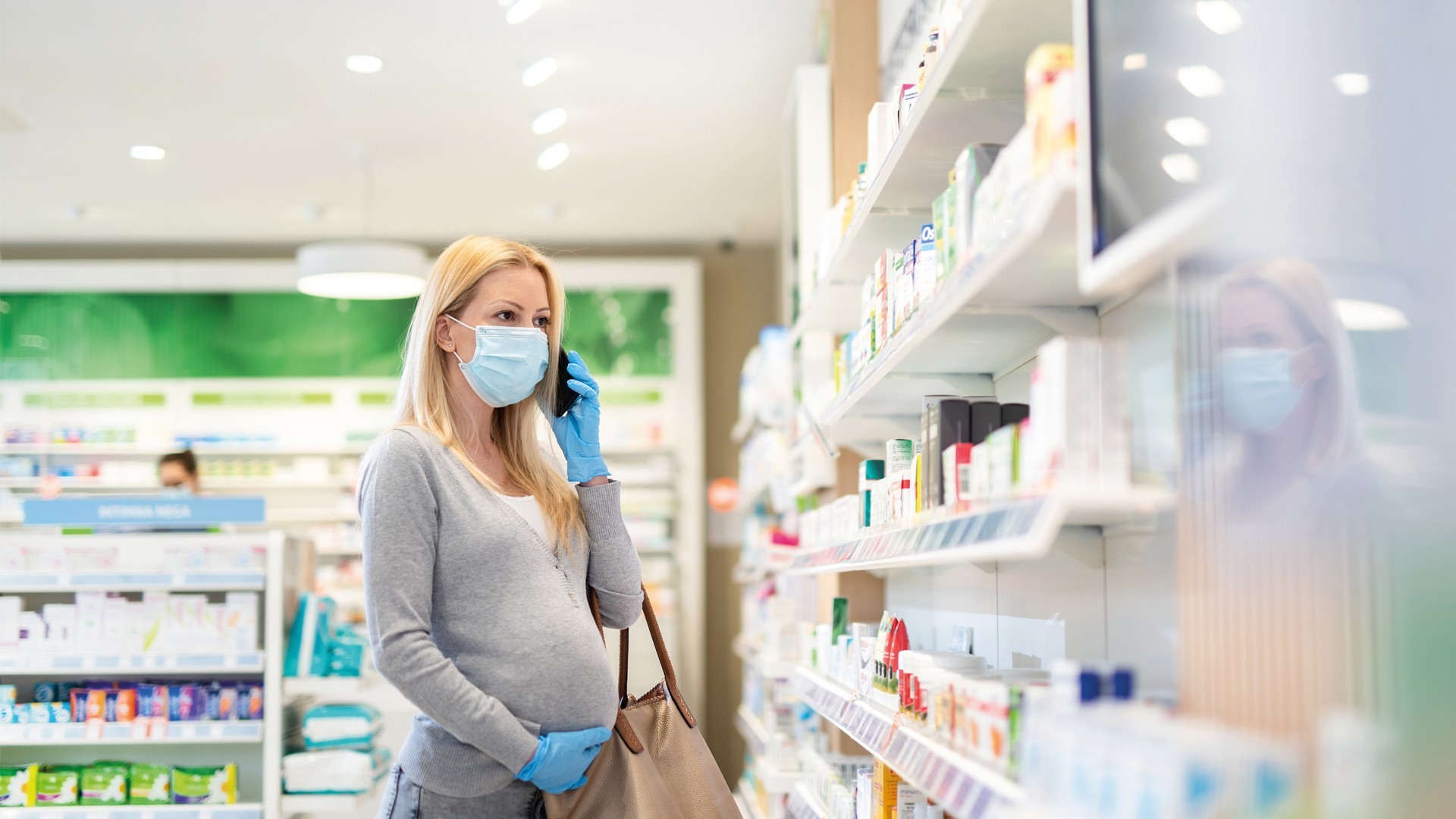In Clinical
Let’s get clinical. Follow the links below to find out more about the latest clinical insight in community pharmacy.Bookmark
Women can sometimes feel overwhelmed by all the advice they receive when they are pregnant or looking after a new baby – so it is important pharmacy is seen as the place to go to for reliable support.
Learning objectives
After reading this feature you should be able to:
- Offer healthy diet and lifestyle advice to pregnant women
- Explain the latest medical advice regarding Covid-19 vaccination in pregnancy
- Deal with the common concerns of pregnant women.
A healthy, balanced diet
Of all the information a mother-to-be receives, guidance on eating a healthy, balanced diet both before conception and throughout pregnancy will help the woman to maintain her health and optimise her baby’s development at the same time.
It is important that women have the information they need to make informed decisions about their diet, says Cath Broderick, chair of the Royal College of Obstetricians and Gynaecologists’ Women’s Network. “We hear from women about the many myths and conflicting advice around the consumption of certain foods and supplements – and planning a baby and being pregnant can be a very confusing and worrying time.”
Research published this year shows that a healthy diet around the time of conception and through the second trimester may reduce the risk of several common pregnancy complications.1 Expectant women in the study who scored highly on any of three measures of healthy eating had lower risks for gestational diabetes, pregnancy-related blood pressure disorders and preterm birth.
A balanced diet includes meals of starchy wholegrain and fibre-rich foods, and at least five portions of fruit and vegetables per day. Dairy is also recommended as an important part of a balanced diet, although pregnant women are advised to choose low-fat options and generally avoid foods higher in fat and calories.
NHS guidance stresses the importance of portion control during pregnancy and not ‘eating for two’. Most women do not require extra calories during the first six months of pregnancy and it is only in the last 12 weeks that they may need to eat more, which should only be an extra 200 calories per day. In addition, women should stay active. A moderate amount of exercise during pregnancy is not associated with adverse outcomes.
Women are also recommended to take some additional nutritional supplements during pregnancy. The latest NICE guidance on antenatal care, updated in 2019, recommends that women should take a daily folic acid (400mcg) supplement before conception and throughout the first 12 weeks of pregnancy to reduce the risk of their baby having a neural tube defect.2
Iron supplementation should be offered routinely to all pregnant women but they should be advised to avoid vitamin A and any liver products.
A daily vitamin D supplement (10mcg) is also recommended during pregnancy and while breastfeeding. Vitamin D is also recommended for young children. “We know from scientific research young children need up to five times more nutrients than adults. However, after their first 12 months, infants may have suboptimal nutrient intakes, particularly vitamin D,” says Zoe Ellis, UK head of consumer medical affairs, Danone Specialised Nutrition.
Other measures women should be aware of to ensure a healthy pregnancy include avoiding drinking alcohol and using illegal drugs, and limiting their caffeine intake.
Smoking
Smoking in pregnancy is associated with a number of adverse outcomes including stillbirth, miscarriage, premature birth and low birthweight. The good news is that the latest NHS data shows that smoking in pregnancy fell to 9.5 per cent last year, the first time it has dropped below 10 per cent since records began.3
The Government has set a target of 6 per cent or fewer pregnant smokers by 2022 and MPs from the All-Party Parliamentary Group on Smoking and Health are urging that this is reduced even further to 5 per cent or less in a new Tobacco Control Plan due to be published later this year.
NICE says the risks and benefits of NRT should be discussed with pregnant women who smoke, particularly those who do not wish to accept help from the NHS Stop Smoking Service.2
“Quitting smoking is one of the best things a woman and her partner can do to protect their baby’s health through pregnancy and beyond,” the Royal College of Midwives says. “Pregnancy is a window of opportunity for significant health improvement.”
Sunshine in early pregnancy
It is known that being in the sun lowers blood pressure and improves heart health. However, the latest research suggests this is not due to vitamin D obtained from sunlight, but is actually a direct effect of sunshine on the skin. The study, funded by Tommy’s, the pregnancy and baby charity, found that getting more sunlight while pregnant can reduce the chance of placenta problems associated with premature birth and babies lost during pregnancy, birth or shortly afterwards.4
“It is often unclear why babies are born early,” says Tommy’s chief executive officer Jane Brewin, “but our new research suggests that sunlight during early pregnancy can reduce the risk – so mums-to-be should try spending more time in the sunshine, while our researchers keep working to unpick this relationship and see if light therapies could be used to prevent premature birth.”
Older mothers
The average age of first-time mothers continues to rise. The latest Office for National Statistics figures show that the mean age of mothers reached a record high of 30.7 years in 2019.5
Dr Mary Ross-Davie, director of professional midwifery at the Royal College of Midwives, says the chances of complications in pregnancy, such as developing gestational diabetes or having a stillbirth, although remaining small, do increase with age. This is particularly the case with women over 40 years old.
“We also know that, as women get older, they are more likely than younger women to have medical conditions that impact on the pregnancy, for example high blood pressure. When women are pregnant at an older age, it is vital that they have appropriate monitoring and support that picks up on any early problems and reduces risks of further complications arising.”
Common concerns of mothers-to-be
Nausea and vomiting
Nausea and vomiting occur most commonly in the first trimester of pregnancy. Symptoms should ease as the pregnancy progresses and typically will clear up by weeks 16-20. If a woman requests treatment, NICE recommends ginger, P6 (wrist) acupressure and antihistamines.2
Indigestion and heartburn
Indigestion is very common during pregnancy, especially in the later stages. NICE recommends that women who present with symptoms of heartburn in pregnancy should first be given information regarding lifestyle and diet modification. Antacids or alginates may be offered to those whose heartburn remains troublesome.2
Tiredness
Tiredness and difficulty sleeping is common throughout pregnancy. In the first 12 weeks this is likely to be due to the hormonal changes a woman is experiencing. Later on she may find it harder to sleep because of discomfort caused by the growing baby. Tiredness could also be linked to a lack of iron. Women should be advised to eat iron-rich foods and to raise their concerns with their midwife, who will have done blood tests to check for anaemia.
Food cravings
During pregnancy, some women have cravings for particular foods and food aversions. It is important to distinguish food cravings from a condition called pica, the eating of non-food items (e.g. soil, clay, soap, toothpaste and ice). Cravings for foods such as sweets, desserts and chocolate will result in increased calorie intake, so advise women to avoid gaining too much weight during pregnancy. Eating a small amount of the food they crave and/or trying to substitute it for a low calorie variety or healthier alternative may be an option.
Constipation
Constipation is a common symptom experienced in pregnancy. Women should be offered information regarding diet modification such as bran or wheat fibre supplementation.
Incontinence
Pregnant women may experience a sudden spurt of urine when they cough, laugh, sneeze, move suddenly or just get up from a sitting position. Pelvic floor exercises may help. Pharmacy teams can recommend a range of incontinence products tailored to the needs of an individual woman.
Infections
Women may be concerned about common infections. During pregnancy, babies are protected from many illnesses, like the common cold or stomach bugs. To avoid infections, advise women to wash their hands frequently and avoid certain foods such as soft cheese (e.g. Camembert or Brie), pate, undercooked food and to drink only pasteurised or UHT milk. It is recommended that all pregnant women have both a flu and a Covid-19 vaccination (see panel above for advice on Covid injections).
Haemorrhoids
NICE says in the absence of evidence of the effectiveness of treatments for haemorrhoids in pregnancy, women should be offered information concerning diet modification instead. If clinical symptoms remain troublesome, standard haemorrhoid creams can be considered.2
Varicose veins
Varicose veins are a common symptom of pregnancy that will not cause harm. Compression stockings may improve symptoms but will not prevent varicose veins from emerging.
Vaginal discharge
An increase in vaginal discharge is a common physiological change during pregnancy. An infection is likely if the discharge is associated with itch, soreness, offensive smell or pain on passing urine. If a vaginal candidiasis infection is suspected, NICE says a one-week course of a topical imidazole is an effective option. The effectiveness and safety of oral treatments for vaginal candidiasis in pregnancy are uncertain and should not be offered.
The risks of Covid-19 to unvaccinated pregnant women
Pregnant women are at risk of becoming severely ill with Covid-19, particularly in their third trimester. Data from the UK Obstetric Surveillance System (UKOSS) shows that one in 10 pregnant women admitted to hospital with symptoms of Covid-19 need intensive care and one in five give birth prematurely.
The Royal College of Obstetricians and Gynaecologists says other recent studies have also found that pregnant women who test positive for Covid-19 at the time of birth are more likely to develop pre-eclampsia, need an emergency caesarean or have a stillbirth.
A new study reports a worrying rise in unvaccinated women being admitted to hospital with severe Covid-19, and evidence that the Delta variant poses a significantly greater risk than all previous strains.6 It also shows that Covid-19 vaccination offers effective protection from these risks.
The study reported that:
- 3,371 pregnant women had been admitted to hospital with symptomatic Covid-19 up to July 2021
- The severity of the women’s illness appeared to have become worse; 24 per cent of women admitted in the first wave had moderate or severe disease, compared with 36 per cent with the Alpha variant and 45 per cent with the Delta variant
- More than 99 per cent of pregnant women admitted to hospital with symptomatic Covid-19 were unvaccinated.
“Worldwide, more than 200,000 pregnant women have now received a Covid vaccine, with more than 50,000 in the UK,” says Nicola Vousden, registrar in public health at the Nuffield Department of Population Health and the first author of the study.
“This study shows that very few pregnant women are admitted to hospital with Covid-19 after they have received the vaccine. Other studies have shown that women who have received the vaccine pass on antibodies to their babies, so the benefits of vaccination to both pregnant women and their babies are clear.”
The Joint Committee on Vaccination and Immunisation (JCVI) recommends that pregnant women are given the Pfizer-BioNTech and Moderna vaccines.
Baby care: What advice can pharmacists give to mums about nappy rash?
Brand view: Metanium Everyday Barrier Ointment.
Common symptoms of nappy rash include red patches, blisters, spots, or pimples on the skin, which may look sore or feel hot to touch. The seven triggers of nappy rash include: weaning, the common cold, teething, antibiotics, first sleep through the night (and consequently staying in the same nappy), diet and loose stools.
Prevention is always better than cure. Following good skincare advice is key to both the prevention and treatment of nappy rash.
To help prevent nappy rash, ensure mums choose a nappy with good absorbency that fits properly and avoid using plastic pants. Also avoid excessive bathing (i.e. more than twice daily), which can over-dry the skin, dry the skin gently and avoid vigorous rubbing. Don't soap, bubble bath products, lotions or talcum powder that can irritate the skin.
Advise mums to change the nappy as soon as possible after wetting or soiling to avoid nappy rash. Clean the nappy area gently but thoroughly, wiping from front to back using plain water or wipes which are fragrance and alcohol-free, getting into folds and creases.
Apply a thin layer of a suitable barrier preparation at every nappy change, which forms a protective layer against urine, faeces and other potential irritants. Leave the nappy off for as long as possible to decrease frictional damage.
If nappy rash occurs, use a nappy rash ointment to relieve irritation and redness. A persistent bright red, moist rash with white or red spots that spreads into the folds of the skin may indicate the rash is infected. Seek advice from a GP if problems persist.
References
- Li M. Healthy dietary patterns and common pregnancy complications: a prospective and longitudinal study. American Journal of Clinical Nutrition. 2021
- NICE. Clinical guideline [CG62] Published: 26 March 2008. Last updated: 04 February 2019.
- NHS Digital. Statistics on Women’s Smoking Status at Time of Delivery: England Quarter 4, 2020-21.
- Tom Clemens, Megaw Lauren, Chris Dibben, Sarah Stock, Richard Weller (2017). The effect of ultraviolet radiation on birth weights and gestational length in a Scottish birth cohort. IJPDS (2017) Issue 1, Vol 1:242 Proceedings of the IPDLN Conference (August 2016)
- Office for National Statistics. Birth characteristics in England and Wales: 2019.
- Impact of SARS-CoV-2 variant on the severity of maternal infection and perinatal outcomes: Data from the UK Obstetric Surveillance System national cohort. Vousden N et al.
Sponsored
 Sponsored education
Sponsored education
A different approach to pain
Complete this interactive video to rethink your pain recommendations and ensure you offer every customer the most appropriate advice
 Sponsored education
Sponsored education
Helping vapers find a path to quit
Help vapers find a path to a nicotine-free life when they are ready to quit with the first NRT product licensed for this indication


Record my learning outcomes